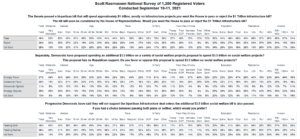Voters are evenly divided when given a choice between passing both the bi-partisan infrastructure legislation and the $3.5 trillion reconciliation package. A Scott Rasmussen national survey found that 40% of Registered Voters nationwide would prefer to pass both bills while 38% would like to see both rejected.
Among those most motivated to vote in the midterm elections, 42% would like both bills to pass and 43% would prefer that both fail.
Sixty-nine percent (69%) of Democrats would like both bills to pass while 62% of Republicans want both to be rejected. Among Independent voters, 31% want both to pass and 38% don’t want either to pass.
Individually, a plurality of voters support both pieces of legislation. By a 46% to 27% margin, voters would like to see the House pass the Senate-approved infrastructure plan. By a narrower 47% to 40% margin, voters tend to favor the reconciliation bill as well.
SIGN UP to receive Scott’s free email newsletter.
CHECK OUT Scott’s latest polls.
Note: Neither Scott Rasmussen, ScottRasmussen.com, nor RMG Research, Inc. have any affiliation with Rasmussen Reports. While Scott Rasmussen founded that firm, he left more than seven years ago and has had no involvement since that time.
Methodology
The survey of 1,200 Registered Voters was conducted by Scott Rasmussen using a mixed mode approach from September 10-11, 2021. Field work for the survey was conducted by RMG Research, Inc. Most respondents were contacted online or via text while 239 were contacted using automated phone polling techniques. Online respondents were selected from a list of Registered Voters and through a process of Random Digital Engagement. Certain quotas were applied, and the sample was lightly weighted by geography, gender, age, race, education, internet usage, and political party to reasonably reflect the nation’s population of Registered Voters. Other variables were reviewed to ensure that the final sample is representative of that population.
The margin of sampling error for the full sample is +/- 2.8 percentage points.



